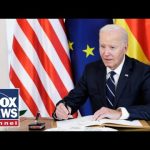In recent developments, the United States has successfully executed military strikes targeting Iran’s nuclear program, marking a pivotal moment in the ongoing tensions between the two nations. This operation comes on the heels of a tumultuous 12-day war, which has significantly altered the balance of power in the Middle East. Former U.S. Secretary of State Condoleezza Rice has weighed in on the situation, indicating that the repercussions of this conflict have made a notable impact, setting back Iran’s nuclear ambitions by nearly 20 months.
The Iranian leadership has been trying to downplay the damage inflicted on their nuclear facilities. The Iranian Foreign Minister, in a surprising move, admitted on state television that there was “excessive and serious” damage caused. This frank acknowledgment conflicts with the more grandiose and defiant statements typically associated with Iran’s leadership, including those from the Grand Ayatollah. Such discord among Iranian officials portrays a possible shift within their ranks, hinting at a crumbling status quo that could pave the way for new dynamics in Iran’s governing structures.
General Dan “Raz” Caine detailed the strikes’ execution and the emotional return of American pilots to their families, underlining the human aspect of military operations. The precise nature of the strikes was a testament to the advanced capabilities of the U.S. military, achieving their objectives with a level of finesse that had not been promised in earlier days. The emotional welcome these pilots received served as a powerful reminder of the sacrifices made, not just by the service members but by their families too.
According to reports, Iranian assets that had long been involved in the country’s nuclear program were taken down with methodical precision, thanks to intelligence sharing that allowed for timely and strategic strikes. The ferocity of the strikes has reportedly left Iran’s nuclear capabilities in tatters, prompting discussions among U.S. officials and commentators about how this damage might influence future negotiations and regional stability. Former President Trump and other lawmakers have expressed that any attempts by Iran to rebuild its nuclear program should be met with swift and decisive action.
As the situation continues to unfold, questions linger about Iran’s next steps and the wider implications for global security. With the Iranian Foreign Minister’s recent trip to China, speculation arises regarding potential alliances and support in a world that seems increasingly strained by conflicting national interests. As analysts keep a keen eye on developments, the reality remains that while the U.S. has managed a significant victory, the road ahead is fraught with uncertainties that could define the next chapter in Middle Eastern diplomacy and security.




